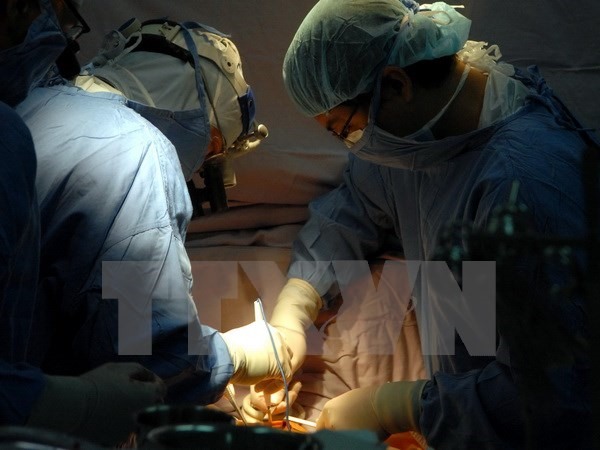 Society
Society

The training provided by leading central-level hospitals in HCM City has helped doctors at provincial facilities apply latest techniques and advances to treat heart patients, reducing the need for emergency transfers.
 |
| Cần Thơ General Hospital has performed a surgery among a patient with arterial septal defect and tricuspid regurgitation thanks to training from Chợ Rẫy Hospital in HCM City. — VNA/VNS Photo Dương Ngọc |
HCM CITY — The training provided by leading central-level hospitals in HCM City has helped doctors at provincial facilities apply latest techniques and advances to treat heart patients, reducing the need for emergency transfers.
In the process, it has also improved the skills and professionalism of doctors at the provincial level.
For instance, doctors at the Cần Thơ City General Hospital in the Mekong Delta are now able to perform open heart surgeries, endoscopies, stent placements and techniques after learning them from the Chợ Rẫy Hospital in HCM City.
Early last week, they implanted pacemakers in two patients 44 and 63 years old. The patients, residents of Phong Điền and Ninh Kiều districts, were admitted with heart rates of less than 40 beats per minute compared to normal 60 to 100 beats per minute.
Moreover, they suffered from bundle branch block, which causes delays and obstructions on the pathway that sends electrical impulses to the left or the right side of the bottom chambers of heart, leading to regular tiredness, vertigo and sometimes, loss of consciousness.
Dr Trịnh Thanh Tâm of the Cần Thơ City General Hospital’s cardiovascular ward told the Tuổi Trẻ (Youth) newspaper that doctors decided to implant pacemakers that would work for a long time, providing electrical stimuli as needed to keep the pulse rate normal.
If this was not done, the patients were at risk of suffering a stroke, Tâm said, adding that this was a noninvasive technique.
Doctors at the Thống Nhất General Hospital in Đồng Nai Province have also benefited from training provided by the Chợ Rẫy Hospital, enabling them to perform many procedures on their own, including open heart surgeries and other cardiovascular interventions.
Dr. Phạm Văn Dũng, the hospital’s director, said it was very important to develop the expertise for making timely cardiovascular interventions and ensuring the patients’ safety.
The Đồng Nai newspaper recently quoted the head of the provincial Department of Health, Huỳnh Minh Hoàn, as saying that learning and using advanced techniques and technological developments is a common trend that hospitals all over the country have to follow in the coming time.
The Thống Nhất Hospital in HCM City and Vĩnh Long Province’s General Hospital also signed a five-year (2016-2020) agreement on training the latter’s staff in cardiovascular interventions within the period between 2016 and 2020.
Since 2013, a Satellite Hospital project has been providing training in advanced techniques for treating heart diseases to private and public health facilities throughout the country.
The project is one of several measures being taken to improve the qualification of doctors, especially those at provincial and grassroots levels, according to Medical Examination and Treatment Department under the Health Ministry.
In a recent conference, Dr Lương Ngọc Khuê, the department’s head, said that residents in outlying areas now had better access to modern treatment.
The availability of modern treatments at more district and provincial hospitals in recent years helped reduce overcrowding at major central and city-level hospitals, he said.
In particular, the rate of transfer to central and city-level hospitals had fallen by 98.5 per cent in patients with heart-related diseases, he added. —VNS




